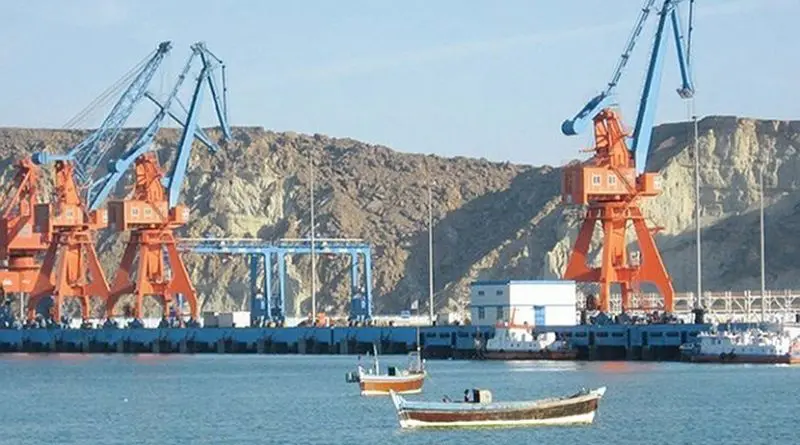Blue Economy And Pakistan – OpEd
The term blue economy refers to the sustainable development of the oceans and seas resources in order to boost the economic growth, improving livelihood, creating employment opportunities and protecting the ecosystem. This term was first coined by Gunter Pauli in 2010 in his book 10 years, 100 innovators, and 100 jobs.1
The coastal line of Pakistan is 1050 sq. km long which make it 74th largest coastal states in the world. Previously Pakistan had 240,000 sq. km of exclusive economic zone however, 50,000 sq km of continental shelf was added in 2015. Being a signatory of United Nations Convention on Laws of Seas (UNCLOS) Pakistan has failed to take advantages of the privileges that are granted under this convention. As a result Pakistan has not is not capitalized on prospects of blue economy.2
Pakistan’s blue economy can play a very significant role in enhancing economic power. The sea routes provide Pakistan with trade opportunities and access to other states around the world. Pakistan has to take decisive steps to create awareness regarding their blue economy among the nation.3
Blessed with a geo-strategic location Pakistan sits on top of one of the most important international trade route which can be used to tap into middle eastern economy. The oil trade passing through Strait of Hormuz allows Pakistan to maintain its relevance and develop its maritime sector.4
Currently Pakistan has two functional ports, i.e. Karachi and Bin Qasim, while the Gawadar port is in final stages of starting its operations. At present the Karachi port is generating a revenue of PKR 9,578.91 million5, according to rough estimates this amount can increase by 70% if Pakistan explores its blue economy and would further increase more attention is paid to it by developing a port framework, including related rail as well as road frameworks. Pakistan can boost its economy by concentrating on the maritime framework, technology for seaward asset improvement and fishery industry. This will enhance employment opportunities for locals, increase the GDP of the country and also increase export volume.6
By developing infrastructure and beaches in Balochistan for different recreational maritime activities, Pakistan can attract tourists from across the globe, which will significantly contribute to the blue economy.7
For centuries ocean has been a treasured source of revenue for humans. It is mined for minerals like crude oil, cobalt, nickel, salt, sand, gravel, and some manganese, copper and iron. A part from providing minerals, it is also a great source of climate regulation as it diminishes carbon and give oxygen. The ocean is an increasingly important source of biomedical organisms with enormous potential for fighting diseases. These are just a few examples of the importance of the ocean to life on land. The conservation and sustainable use of marine resources, oceans and seas to ensure the provision of economic and social benefits and ecosystem services to humankind. This makes the exploration of oceans even more important and enhances the role of blue economy towards the growth of a nation.8
The expansion of blue economy would initially require a lot of capital investment that should be allocated to reap the long term economic gains. However, this will only be possible if proper awareness campaigns are run for the masses so that both private and public sector gets involved in the blue economy. If this is not done on a priority basis, the fragile Pakistani economy will not get the cushion from local resources and we could further plunge into foreign debt.
*Pakizah Perveen, currently working as a research intern at institute of strategic studies Islamabad (ISSI).
Notes:
1. S.Smith Godfrey, ‘defining blue economy ‘, Maritime Affairs:Joural of the National Maritime Foundation Of India, Volume 12, page 54-63, April 26 ,2016. https://www.tandfonline.com/doi/abs/10.1080/09733159.2016.1175131?journalCode=rnmf20
2. Pakistan’s ‘Blue Economy’: Potential and Prospects, ‘Institute of Policy Studies Islamabad’, May 7,2014. http://ips.com.pk/index.php/en/ips-lead/trainings/1105-pakistan-s-blue-economy-potential-and-prospects
3. Maritime Awareness in Pakistan. Accessed at July 3, 2018. http://www.defencejournal.com/2000/oct/maritime.htm
4. Ibid.
5. Presentation by Mr. Waqar Ahmed Sr. Joint Secretary Ministry of Maritime Affairs at Institute of Strategic Studies Islamabad
6.Ibid. ibid
http://www.defencejournal.com/2000/oct/maritime.htm
7. Ocean Resources”,Marinebio”. Accessed at 3 July 2018. http://marinebio.org/oceans/ocean-resources/
8. Blue economy for marine resource development,”Eco-Business”,march 20,2014.
http://www.eco-business.com/opinion/blue-economy-marine-resource-development/

